Meltemi! 12 days in Methana
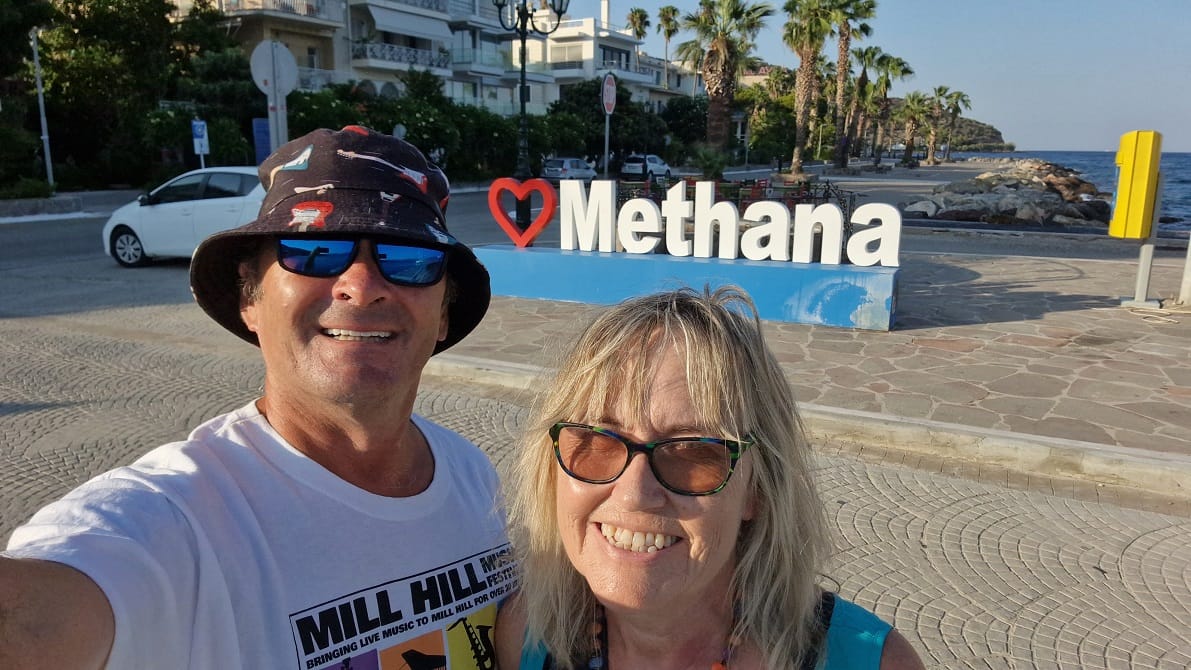
A period of strong northerly winds was forecast to start around Tuesday 5thAugust 2025. These would make the anchorage in Aeginitissa Bay very uncomfortable. The winds are known as a meltemi and they blow periodically in the Aegean Sea from about mid-May to mid-September. They originate from the Bosphorus having brewed near the Black Sea. When there is low pressure over Turkey and a high over the Balkans they form. A safe harbour was needed so we set off towards Methana until things calmed down.
It seems that most of the people who read my blog are close family and friends. If you are a sailing person looking to find out about nice places to stop when sailing in Greece I’ll save you the effort of reading this. Methana has seen better days, it smells of sulphur, there isn’t much to do and the quayside is an overcrowded free for all and can be quite bouncy, so you might as well go somewhere else. * **
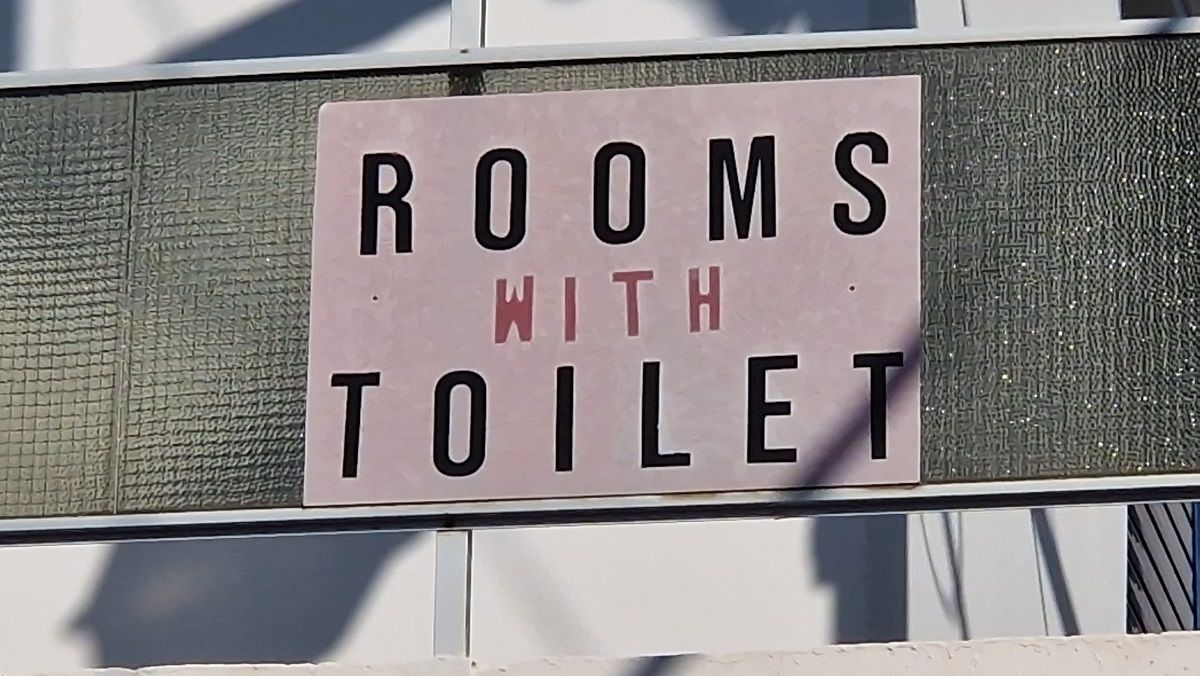
For the others here is a bit more about Methana. If you look at the map you might think it was an island, but it isn’t. At the southernmost point on the map you will see a tiny umbilical connection to mainland Greece so it’s a peninsula. The roads are narrow and steep so ferry (or boat) is often the easiest way to get to the capital, Athens, a good 2½ hours car journey.
Methana is a volcano, which thankfully has behaved itself for a long time. The volcano gives rise to hot springs, and the main town, also called Methana, has a huge and impressive thermal bath resort, built in the 1930s, sadly no longer open.
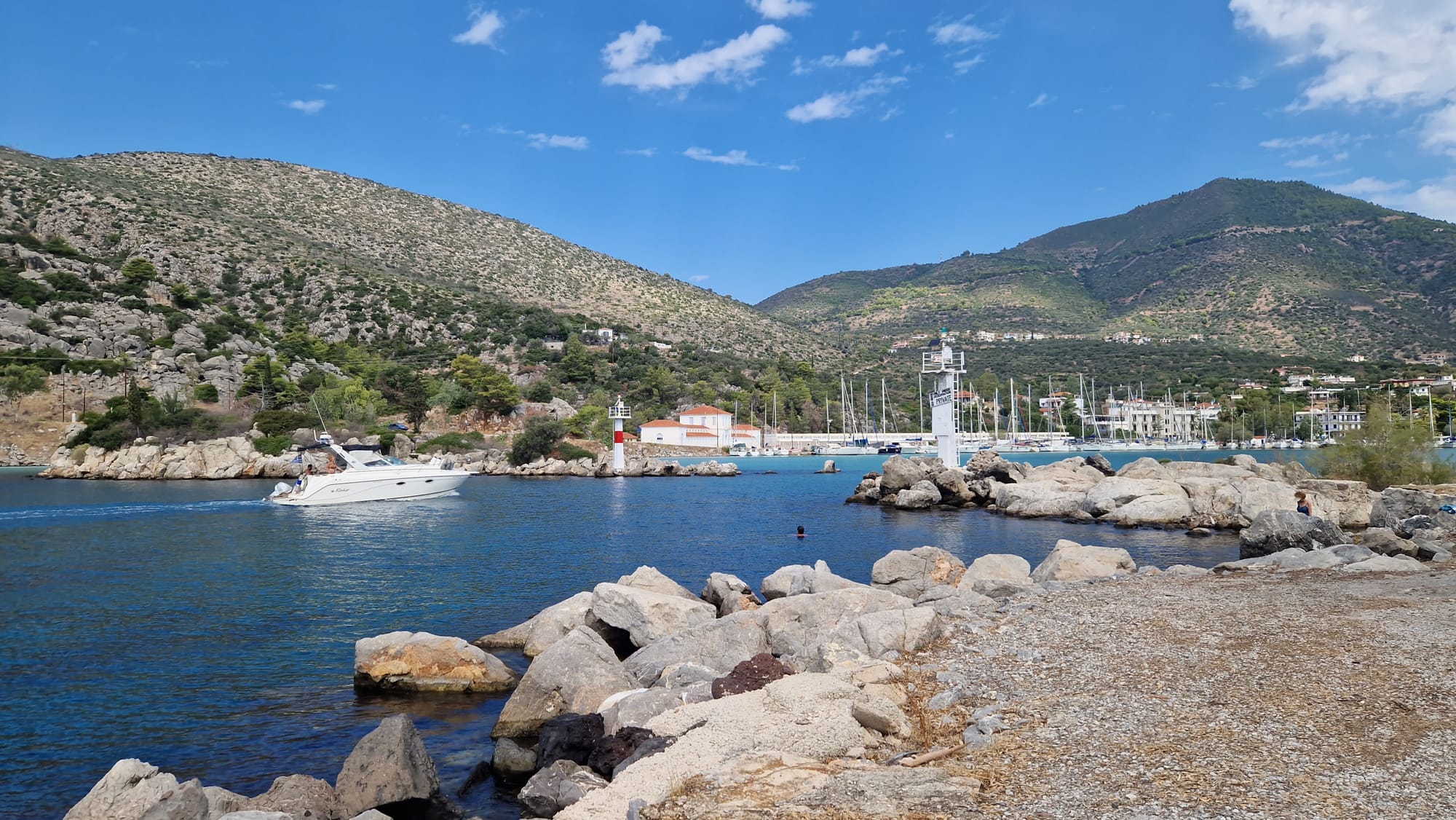
The pool outside the spa is a pale blue green eau de nil colour, contrasting with the terracotta roof of the hotel behind. Given that the minerals in the thermal bath are methane and hydrogen sulphide or rotten egg gas (which is really nasty) I am at a loss to work out what the benefits could be but I’m open to suggestions. The smell can be as unpleasant as you would expect but nose blindness helps.
The water in the town marina, not open to touring yachts, is the same. It is quite beautiful…and then you breathe which kinda spoils the illusion.
There were two possibilities for a port for shelter, Vathi or Methana town. Vathi is very small. Methana town is bigger and we’ve visited several times so we know our way around. Vathi is all the way on the other side of the peninsula, so if it turned out to be full when we arrived we might miss out on a berth in town, which can get very crowded, after trekking all the way back. Easy choice.
Approaching Methana from the sea it looked as though it was full, lots of masts. As Libra neared the quayside we realised that the masts were either in the marina, a few hundred yards behind the port, or else lamp posts masquerading as masts. There were hardly any boats at all here. We chose a place and secured ourselves stern-to the quay. Shortly after, another cruising sailboat arrived and parked itself right next to us, knocking against us as it approached. Why they needed to moor so close with an empty quay is another matter.
We both had memories of the ‘Pirate Ship’ in May (see https://librasail.uk/attacked-by-pirates/). Thankfully no damage this time, this boat was smaller and slower. Coincidentally I looked out of the porthole only to see our friend the pirate ship approaching the harbour. Luckily it kept well away from us, mooring side to on the L shaped quay. We didn’t bother reacquainting ourselves with the captain.
The evening after arriving we decided to have a recce to Vathi and eat dinner there. The taxi arrived promptly and the drive was about 15 minutes, up and down the hills and through small villages. At one point we went around a blind bend only to meet a car coming straight towards us. The road was only one vehicle wide so the taxi had to back up until it widened out. The drivers were so polite to each other, no fuss, no standing of ground.
Vathi is so pretty. The harbour is tiny and was full of charter boats both along the small quay and tied to the rocks opposite.
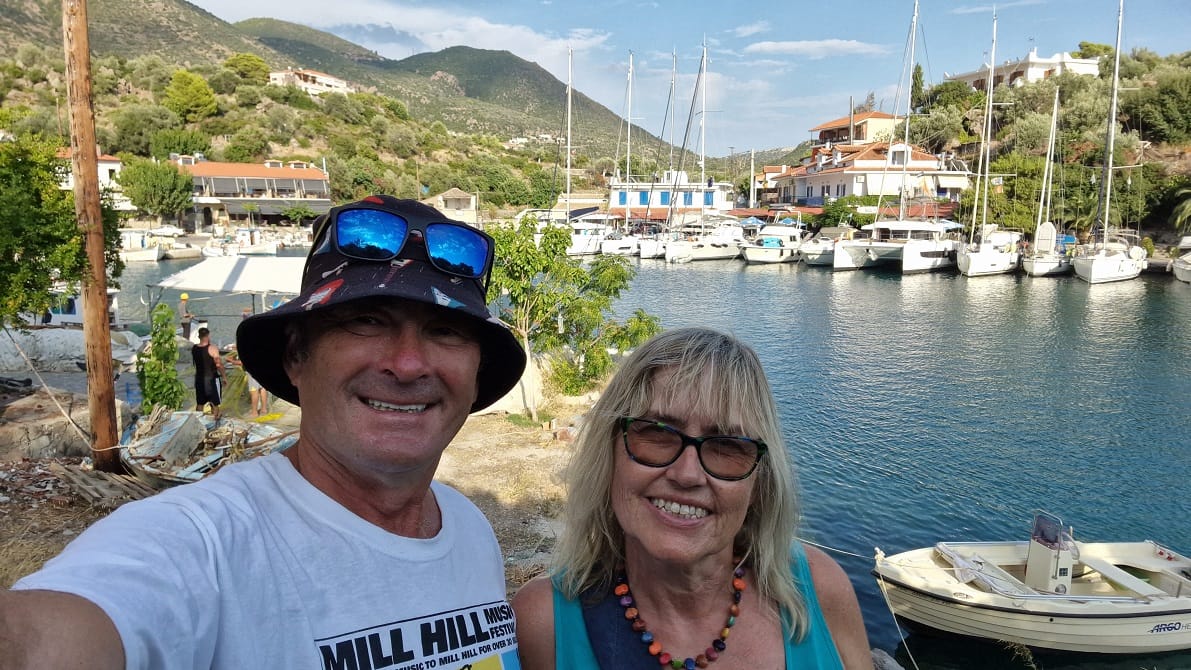
A guy on a jet ski and another on a small tender with outboard took the lines of a big catamaran that arrived and needed to dock.
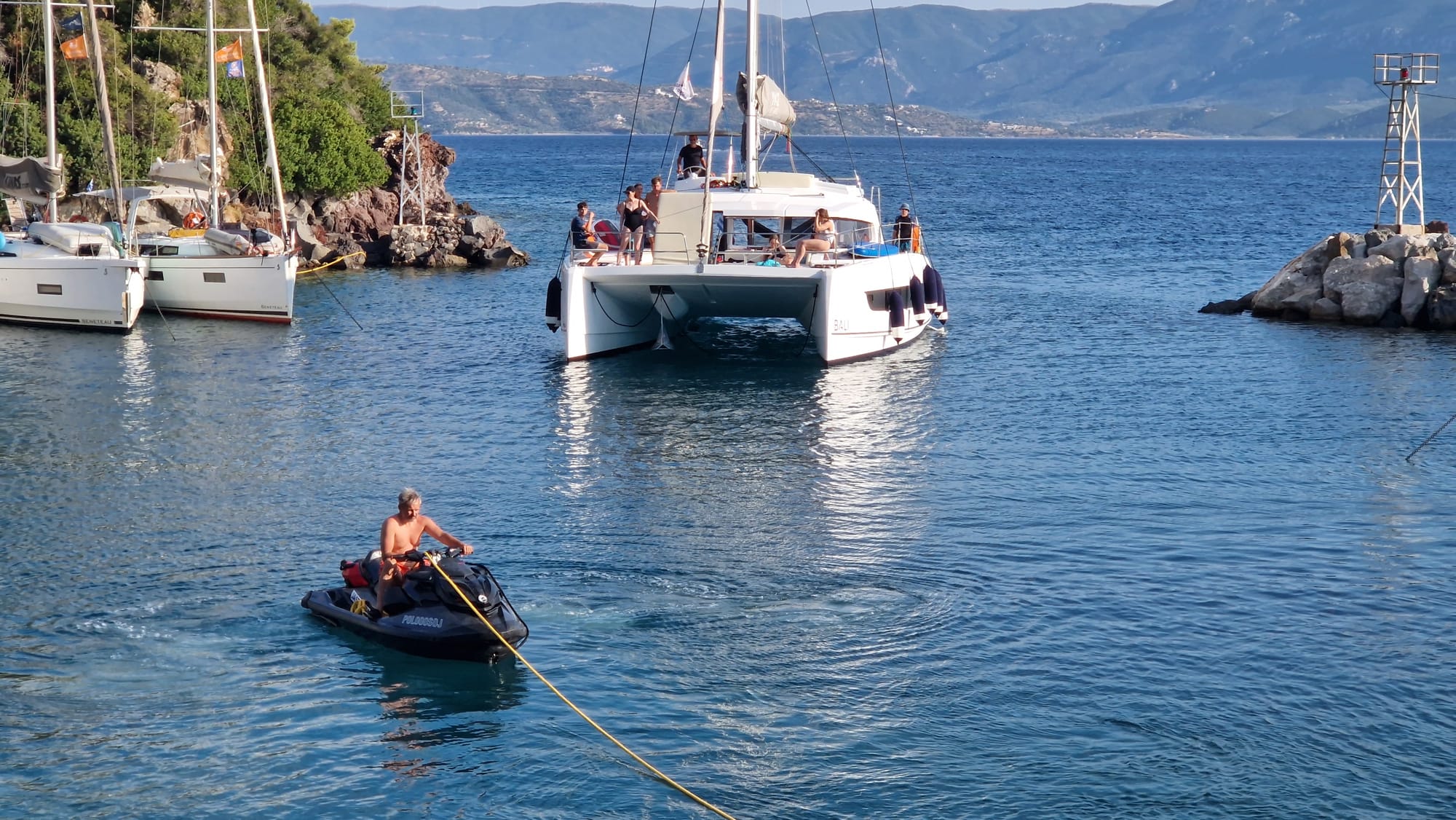
Around the quay were five or six restaurants and some guest houses. That was it. There doesn’t seem to be anywhere within walking distance. Lovely for an overnight stay but I wouldn’t want to be stormbound here.
We chose a restaurant and had a delicious meal, prawns cooked in a tomato and feta sauce and grilled fresh squid, plus a Greek salad and complimentary grilled bread, tsatsiki and cheesy dip. There was also a free dessert of deep fried dough balls with chocolate sauce, so good. The waiter was a boy of about 10 or 11, learning the family business under the watchful eyes of his mum. Memorable.
While we were eating we spotted a familiar figure, the harbour master from Methana Town. He looks after both harbours. Useful life hack if you're sailing here: if you're in Methana you can ask him how busy it is in Vathi, potentially saving a wasted trip. It was busy for the whole of our stay.
The taxi arrived to take us home as the sun was setting. The views were even more stunning than on the way here. What a place!
With strong northerly winds Methana is a useful port of refuge. The quay offers some protection from the big seas outside. The worse the forecast the more boats come here. When we arrived back from Vathi the quay was full. Severe winds were forecast for that night. Every space on the quay was taken and four or five boats were taking shelter in the protected harbour.
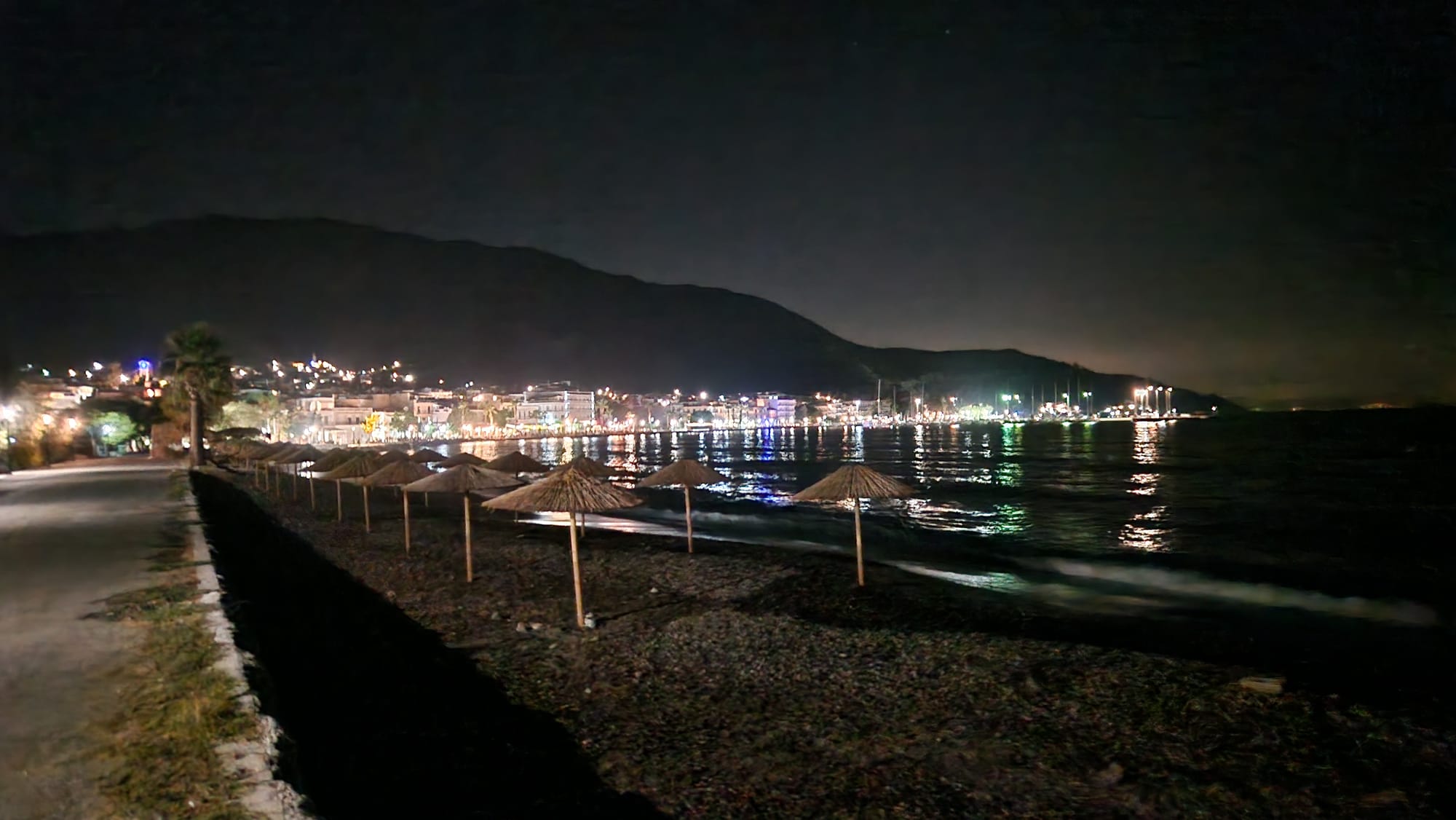
That night wind howled endlessly but Libra held steady. I opened the hatch in the morning and was blasted with sand carried on the gusts of 35 kts, over 40 mph, coming straight inside. The deck, the saloon and our bed (due to an open hatch) were covered in gritty grey sand. I shut the hatch quickly.
This weather continued on and off until we left. When the wind dropped the harbour emptied and vice versa.
The winds whip up the sea and despite the shelter the weakened waves cause movement in a light boat like ours. This means that the passerelle or plank for getting on and off the boat moves too. It could work its way off the dockside and into the water so had to be kept on deck at all times unless in use. It was so bouncy for so much of the time that Igor had to hold my hand to help me every time I got on or off the boat.
Not quite sure what I’m scared of except for the indignity of falling, the water is clean and warm. There were evenings when we planned to go for a restaurant meal but the sight of the passerelle was enough to make me resort to a tin of chicken curry instead.
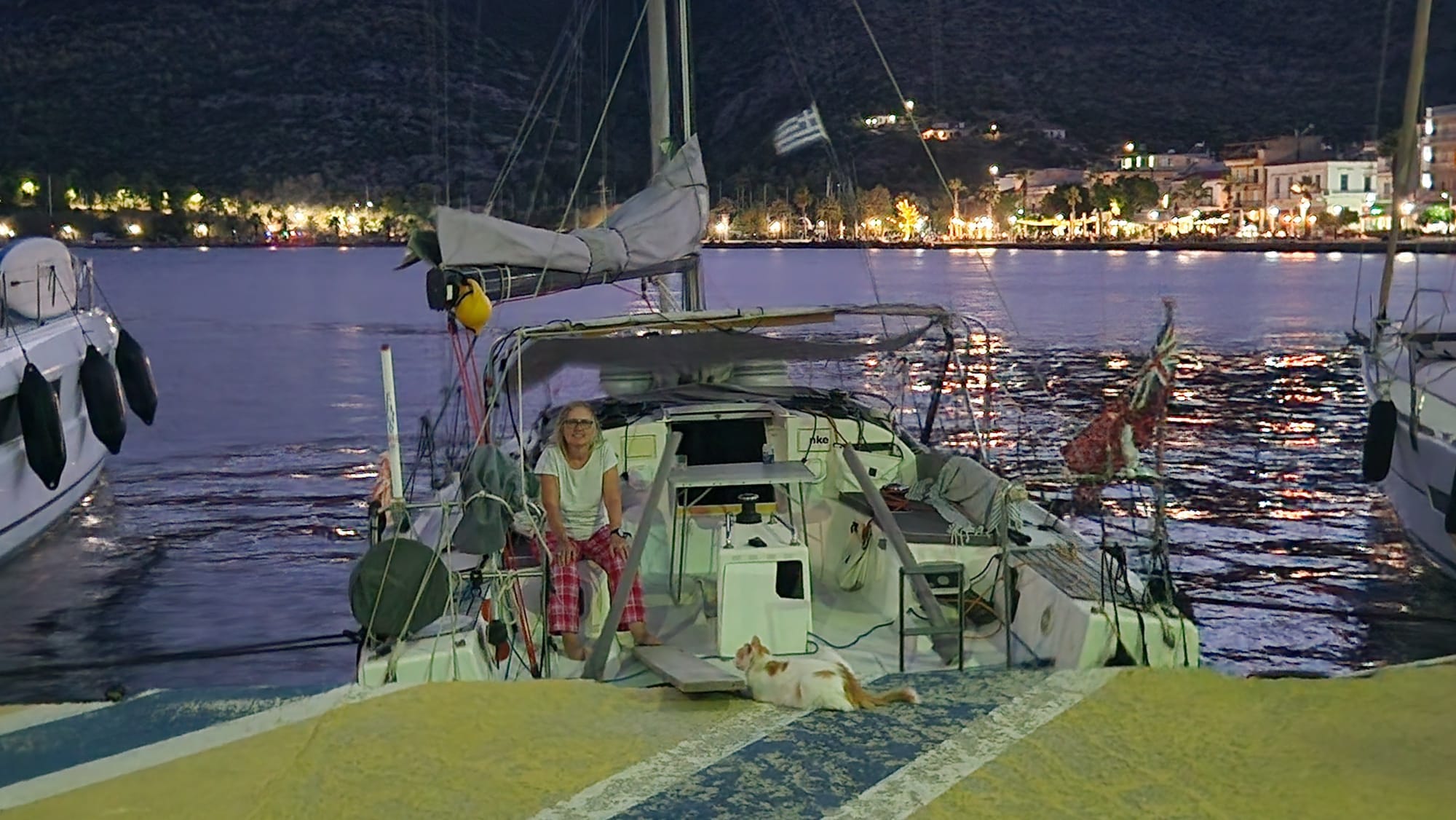
Another contributor to the constant movement of the passerelle is the ferries which dock several times a day. Most of them carry vehicles as well as passengers and they go to Piraeus, Poros and Aegina. Our mooring was directly opposite where they came in, so about twice a day we would sit and watch the big boats.
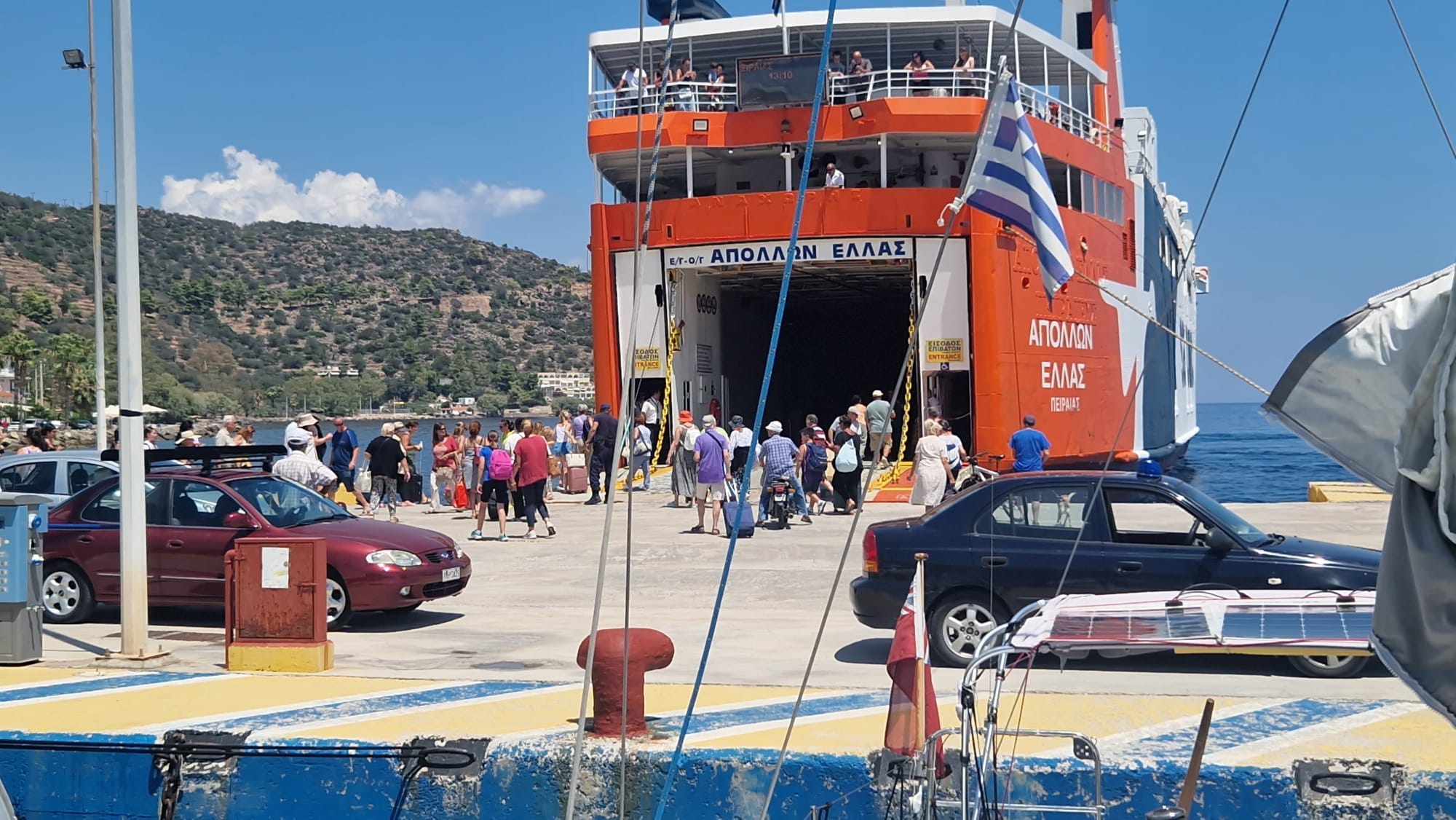
Lots of boats came and went during our stay, and the level of skill of their skippers was variable. Some politely ask you to help with their lines when they moor and apologise if there’s the slightest possibility that their anchor chain has crossed yours. Others reverse aggressively into the space next to you then deny that their boat hit yours despite half a dozen witnesses and video evidence of the collision.
One particularly unpleasant skipper not only did this but then refused to give his insurance details and the name of the owner of his charter boat. We ended up calling the police, a high risk strategy as if they suspect that your boat is damaged they can confiscate your ship’s papers and prevent you from leaving. A quick google search revealed the name of the charter company. Their engineer came next day, acknowledged that the incident happened but confirmed that the damage was cosmetic. Our poor Libra, everybody keeps picking on her!
Have to say that the Port Authority officers were extremely polite and helpful. They even got an interpreter for the meeting they held with us and the Italian charterers.
On days when the quay looked like it would get crowded we would sometimes rearrange our mooring lines to minimise the distance between us and the boat next door, ensuring the space was too small for another boat to squeeze into.
We have got to know most of the restaurants in Methana. The town is more or less a grid. The first road is by the waterfront. There are tables by the quay, perfect to watch the sun set and the moon rise. The menu is the same as pretty much every waterfront restaurant in the Saronic – souvlaki, saganaki, fried fish, moussaka, Greek salad and variations thereon, good but unimaginative.
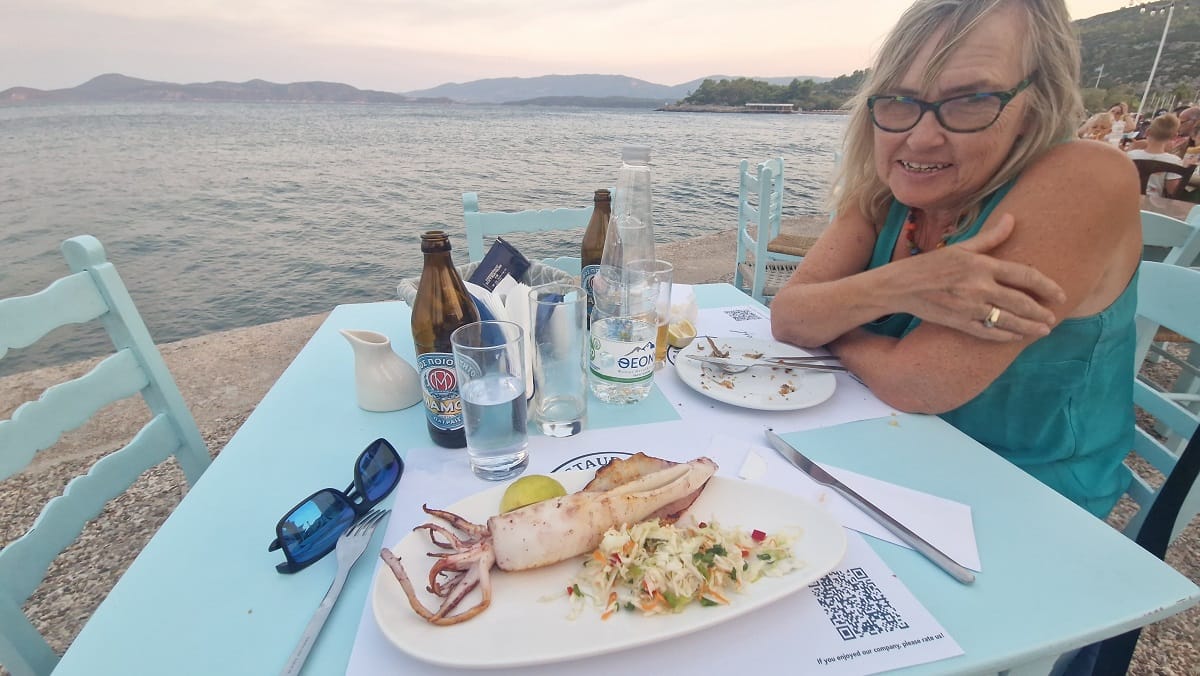
Once you’ve tried these you walk up the side street to the second road from the water and there you’ll find ‘Mama’s’. I wrote about it in my previous blog, it’s all homemade, proper food.
This time we went to the third road back, to another restaurant, Demeter’s Place. Outside was a sign saying ‘Air conditioned’. That sounded good on a hot and airless evening.
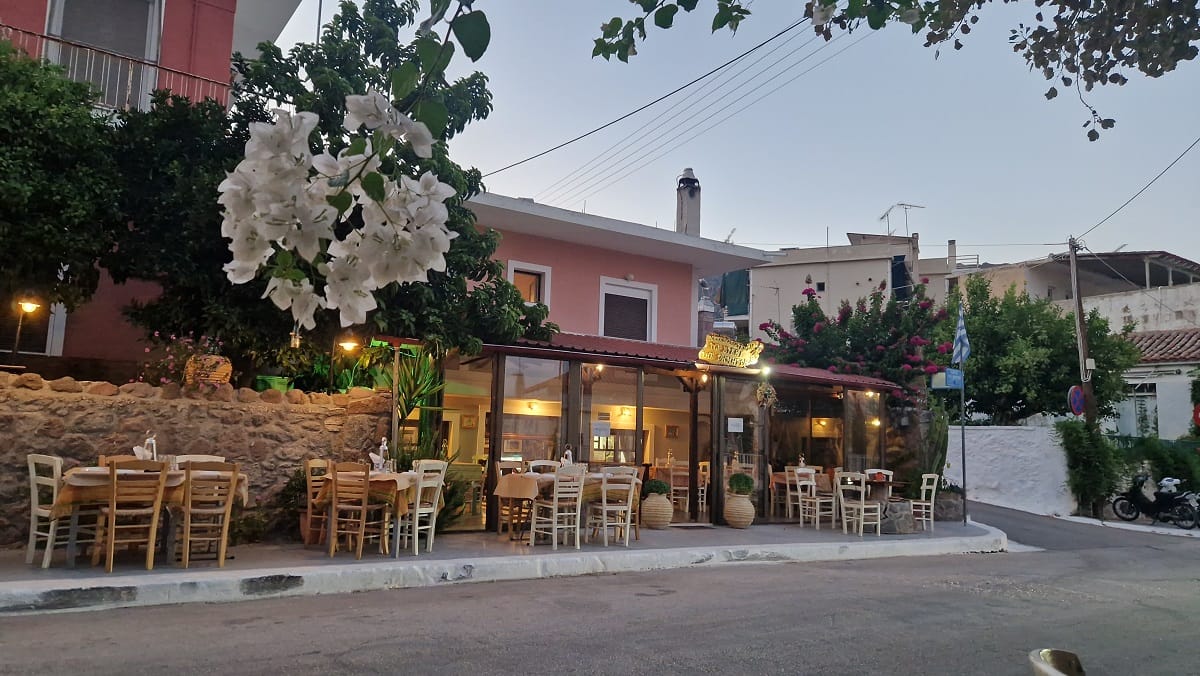
Inside there were about 10 widely spaced tables and a huge fireplace in one corner. This was a good sign, suggesting it was open in the winter so catering mainly to residents of the town. We were given the menu. We didn’t recognise most of the dishes. Another encouragement, we wanted a change. Igor ordered Titsikakia (or a similar word) Politika, I went for fried chicken with mushrooms and peppers and got a side order of fried potatoes. We sipped our beer and waited for the food.
First to arrive were the potatoes, a decent sized plate of chips. I bit into one and was immediately transported back to my childhood. My wonderful Mum hardly ever cooked chips. She didn’t like them and thought they were too much trouble. I only had home made chips a handful of times. These chips were the same as I remembered hers, fresh from the oil, crispy outside, soft in the middle. I wanted my brothers and sisters to somehow be transported to the restaurant to share this blissful experience. I told Igor, but obviously we had very different childhoods and he just thought they were nice fries.
Igor’s food came next. Little bullets of mince with a side of (more) fries and tsatsiki dip. Looked pretty good. I had to wait for mine. I wasn’t expecting what arrived. It resembled sweet and sour chicken, cubes of chicken stir fried with quartered mushrooms and shredded peppers in a sauce that tasted of balsamic vinegar and honey. Igor swapped one of his beef patties for some chicken. He was so impressed he swapped another one. It was a massive portion, we ate every scrap.
The restaurant owner was lovely too, very friendly, as was a kitten who came to join us and allowed me to have a cuddle (the kitten wasn't inside the restaurant by the way, the photo is from the second time we went there).
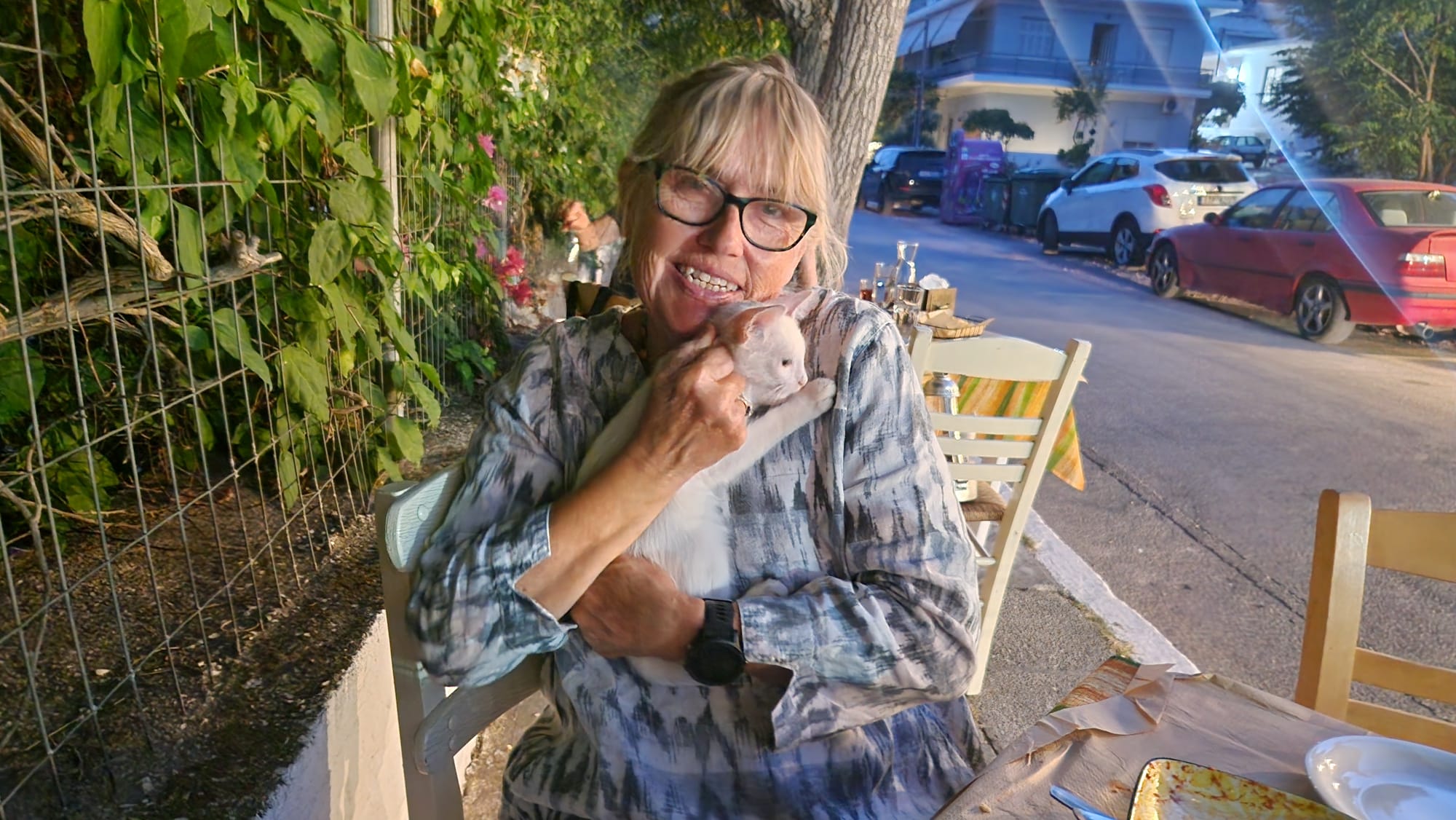
What a fantastic place, and the bill was way less than on the waterfront. We went back later in the week and it was just as good.
Methana has decent beaches within walking distance of the quay. Turning right the rocky foreshore gives way to a series of beaches. One of them has a small pool fed by mineral hot springs from the volcano. It’s lovely but very popular so usually has people in it when we go past, pity. Only 3 or 4 at maximum would fit in and you’d have to be on good terms.
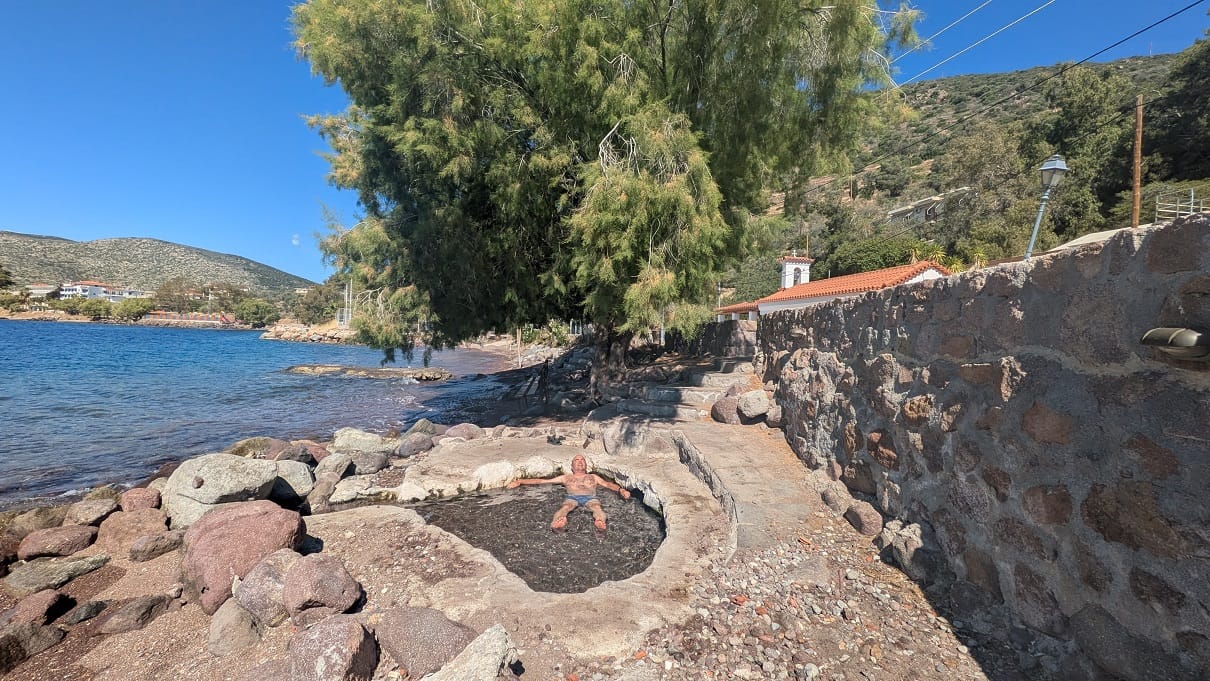
If you turn left from the quay you walk past the restaurants facing the harbour. You can swim from here if you want to but if you carry on a little further there’s a proper beach with straw umbrellas and a caravan selling drinks and snacks. With all the wind during our stay the waves have been strong at times, coming up beyond the umbrellas to the people on their sun loungers. The seawater by the shore is all churned up and full of seaweed for the same reason, though once you get beyond the breaking waves it’s clear and blue as usual.
Opposite the beach, behind a line of trees, is the marina with its sulphurous waters. As you carry on down the path you reach a church built on the hill above the bay leading to the marina entrance.
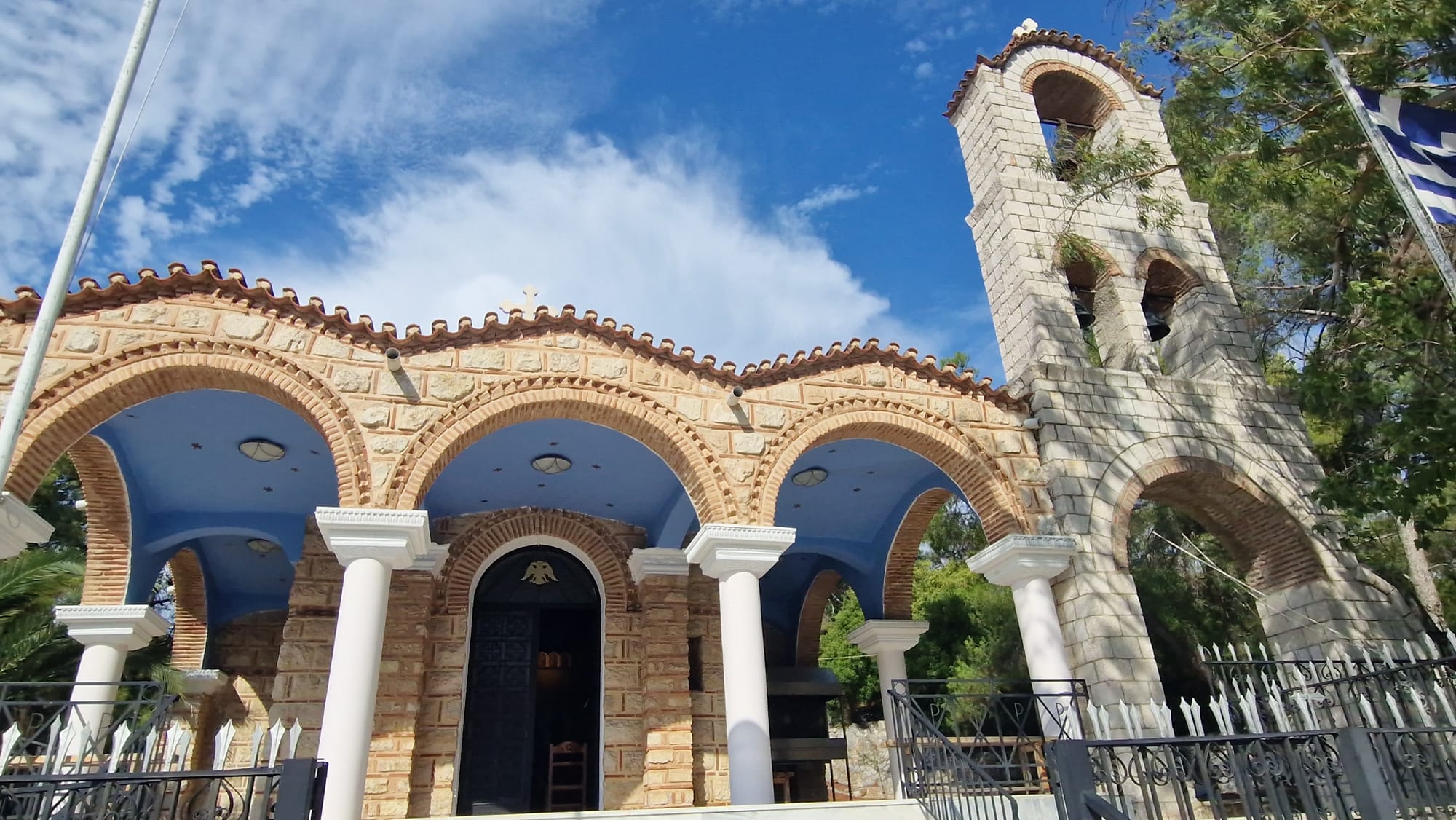
The first time we came here there were people in the water. They looked like they were enjoying it. It’s very sheltered, no waves even if the main beach has huge rollers, and deep enough to dive into the water from the surrounding rocks. If you prefer there’s a sandy place to walk in sedately. As you swim a little further you meet the mineral rich outflow of water from the marina, which is warmer and murkier than the rest of the sea. It’s so calm, you get the benefits of the minerals and can just hang in the water like one of those marine creatures that float aimlessly in these beautiful waters.
Once you finish swimming there are sun warmed rocks to lounge on. This is particularly pleasant in the morning before it gets stinking hot, but the afternoon is pretty good too. It’s then a short walk to the nearby beach which like many Greek seafronts has a shower, very civilised.
The terrain by the water is relatively flat so we have finally been able to get out for a few runs in the mornings. It’s weird how you acclimatise to the heat. The temperature overnight drops to the high twenties C but with just a sheet and a couple of fans it's comfortable. Even early in the morning the temperature is high 20s/low 30s. The constant meltemi comes from the north so has a really pleasant relative coolness.
So we stagger out of bed, put on our running gear and set off. The route starts flat then climbs, some bits steeper than others. The first time I did it it half killed me.
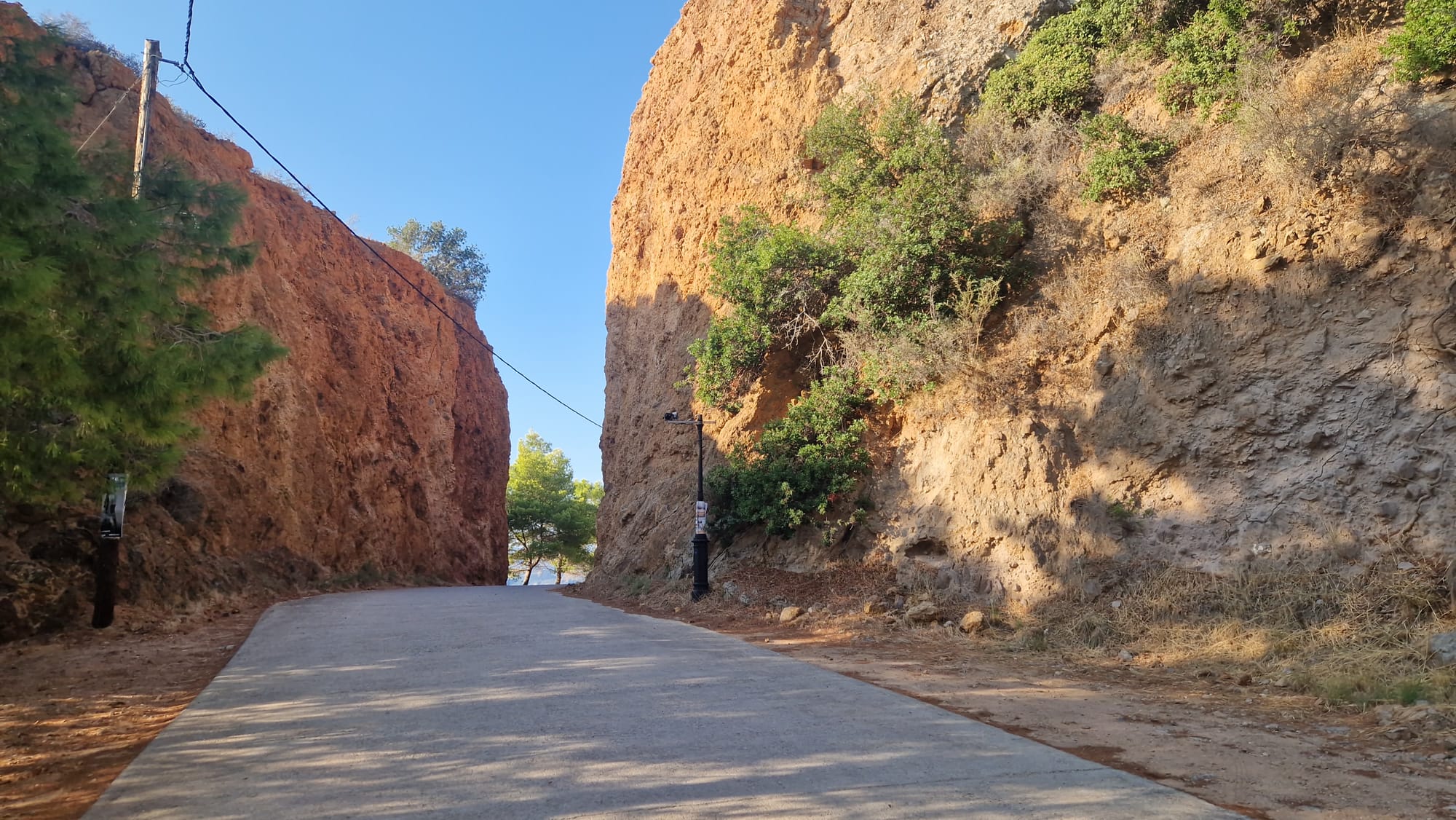
We ran it four times during our stay and it got a lot easier every time. At the end of the run we’d jump in the sea and swim to cool down then have a shower by the beach. Very invigorating.
So we’ve had a really relaxing time. Methana has everything we need – safe mooring, nice places to eat, a bakery, a couple of small supermarkets and a choice of places to swim with fresh water showers.
Methana has the air of a town that has passed its heyday. As well as the disused spa, a very attractive building, there are numerous abandoned buildings in prime locations. One of the seafront restaurants used to have a very upmarket casino back in the 1940s (according to the menu). Now it's just a shell.
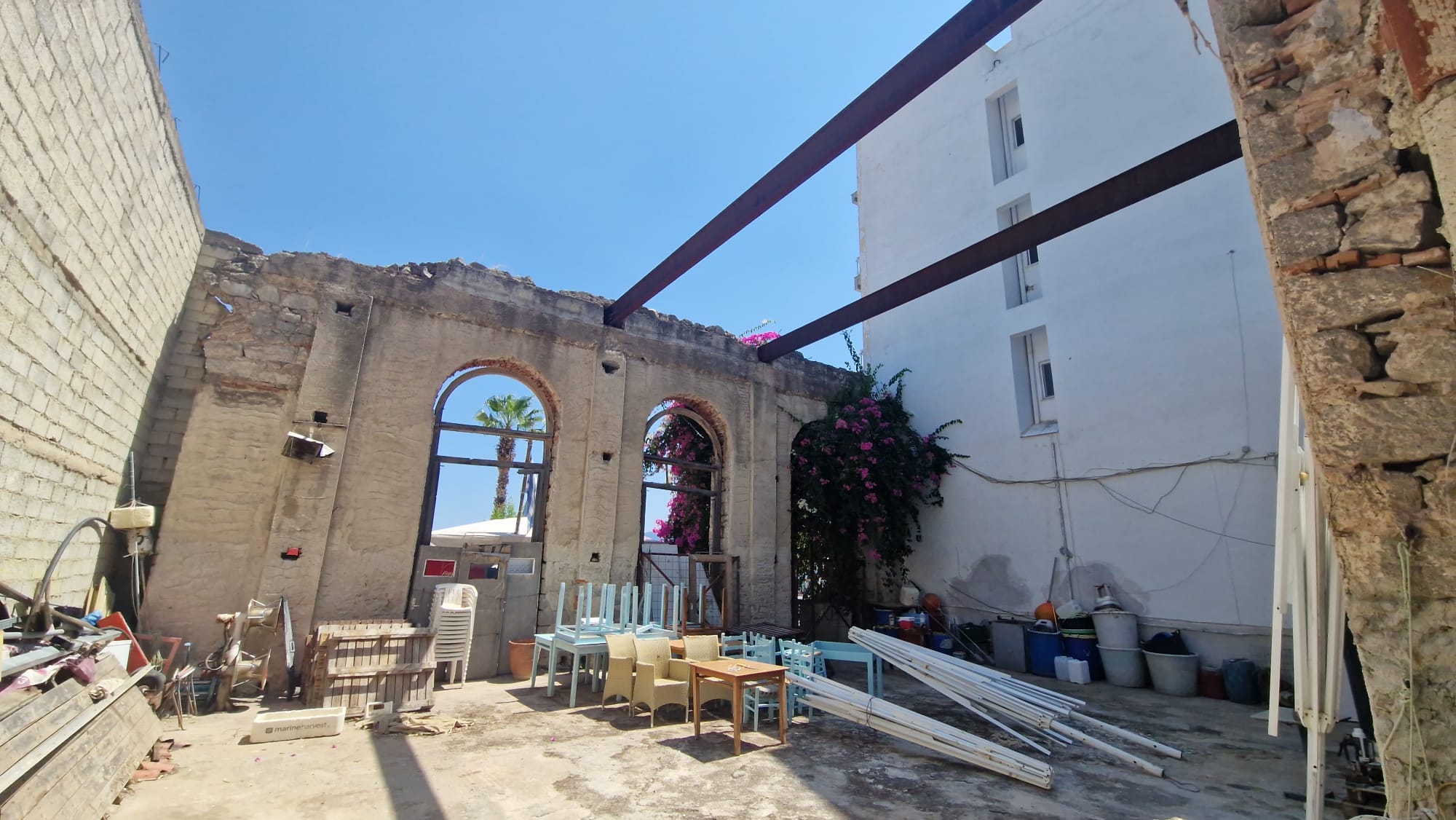
Likewise in the street just behind there is an abandoned hotel. It's been in this decrepit state since we started visiting Methana. It seems to be a thing in the Greek cityscape, many places have older buildings right in the centre of town falling into ruin.
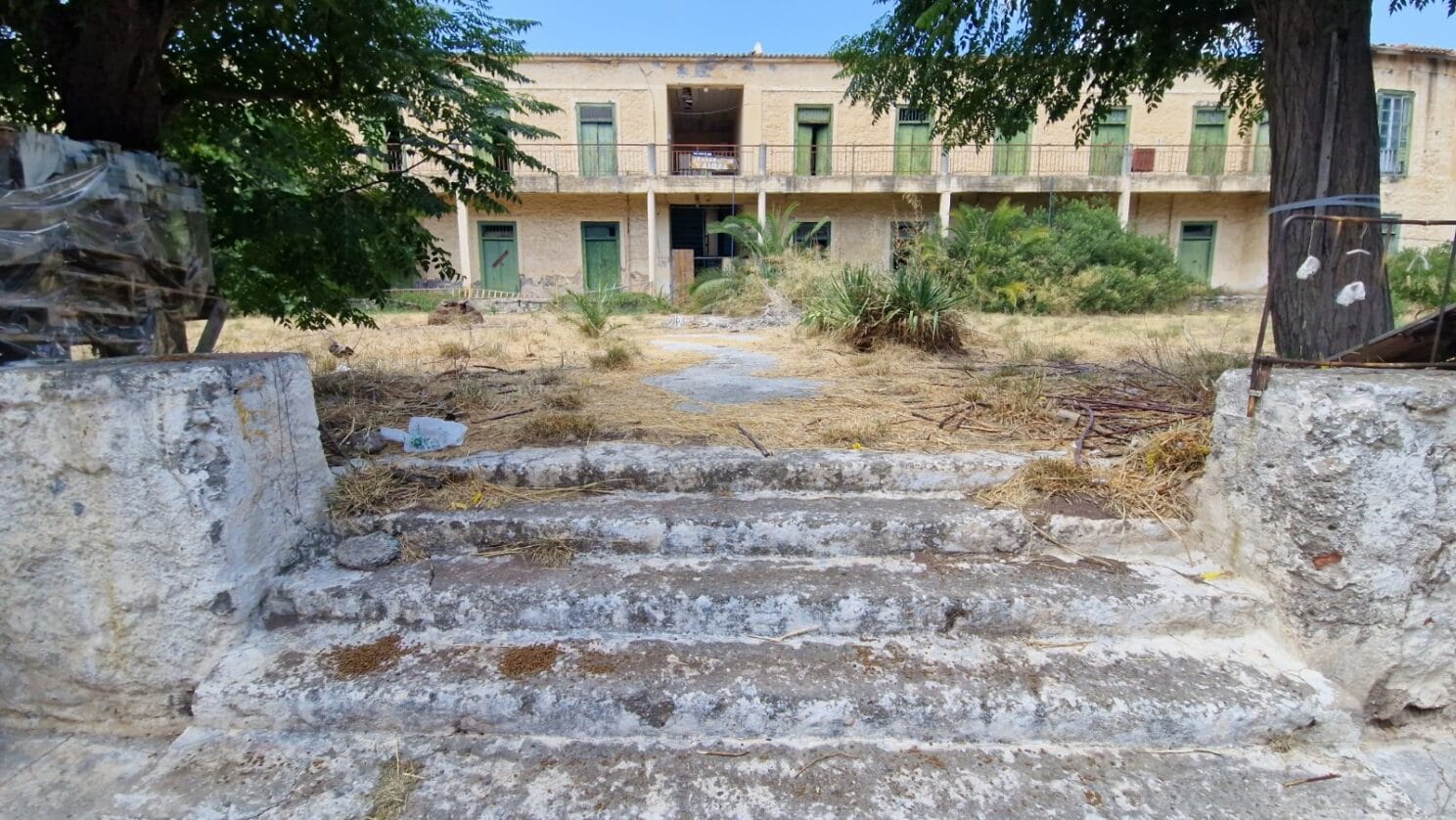
I’m actually hesitant to say how much I’ve enjoyed Methana in case everyone else comes too. It’s definitely busier than on our first visit nearly 10 years ago. If it wasn’t for the idiots on the other boats it would be perfect, hence my comments at the start of this blog addressed to other sailors.
The weather forecast for Sunday 17th showed that the winds should abate. Saturday night was peaceful, apart from a live performance by a Greek pop group who had a full stage and PA on the quay.
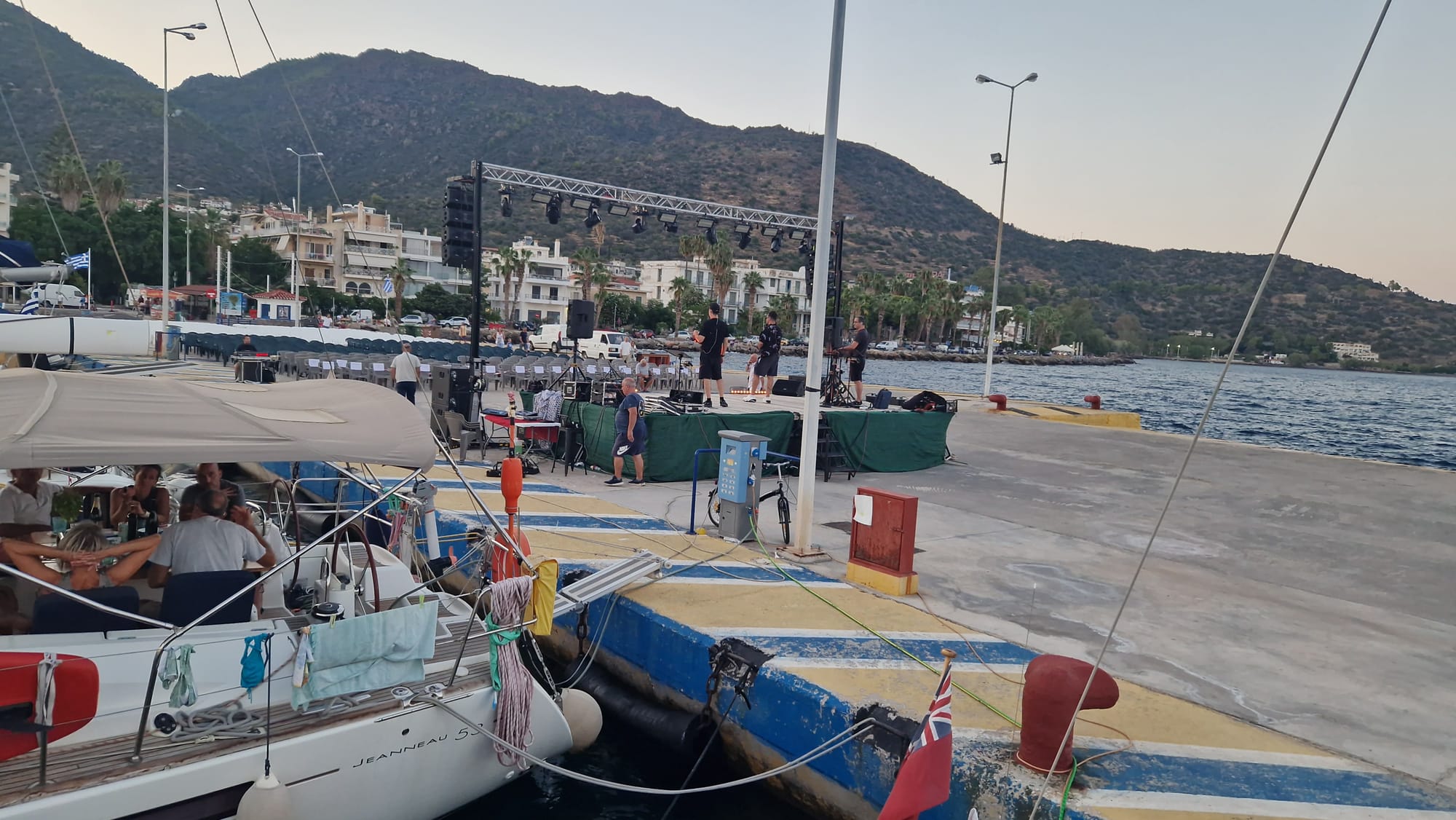
We woke in the morning and the stage and seating had all been cleared away first thing. It looked like a good day to move on. We readied the boat. I braved the gangplank to go to the supermarket to buy more bottled water, dropping off the recycling in the bins provided, picking up a stray plastic glass left over from last night. We set off around 10.30 and headed towards the island of Poros for a look around. It’s maybe 8-10 years since our last visit.
When we were chartering a favourite stopover near Poros was Russian Bay, a protected anchorage and beach with an interesting history, completely unrelated to the current oligarchy. As we passed it it was busy, lots of big flashy motoryachts in the bays next to it as well. We had a nostalgic look at where we used to anchor then moved on.
Poros Town is an extremely popular spot. It now has a big anchorage in the bay by the town itself. Surprisingly the quay wasn’t busy. My guess is that the charter boats had left in the morning and by evening it would be full up again.
Poros is very pretty, it’s built up a hillside and the houses are shades of pink. With all the boats in the harbour it somehow reminded me of Venice, don’t know why.
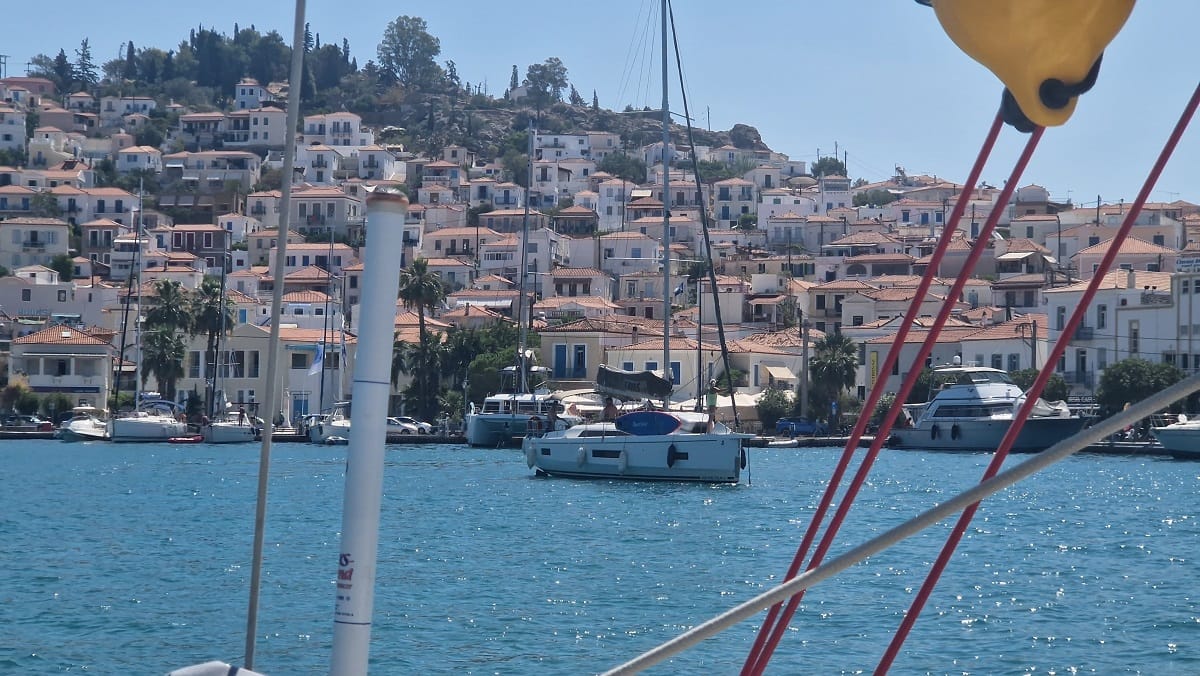
From here we carried on around the island, next to the marked channel and through another anchorage. I spotted a weird looking boat and said to Igor, 'That looks like a submarine'.
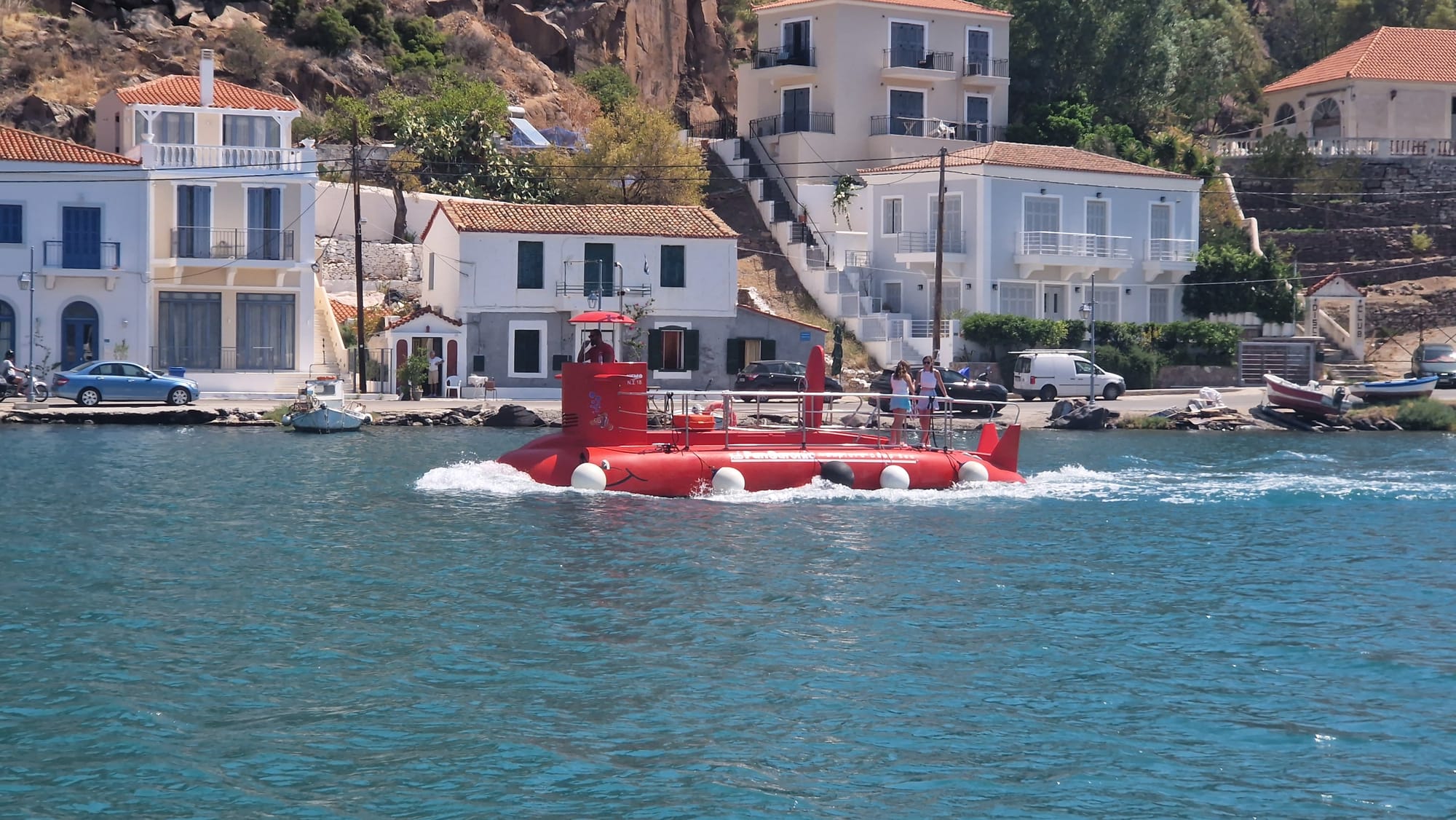
As we left the town behind us Igor pointed out a small island. After this we would turn and be able to sail, so I made lunch, just a sandwich. When you’re motoring in almost empty waters you can leave the hard work to the autohelm and eat in peace, but when you’re under sail you need to pay a bit more attention.
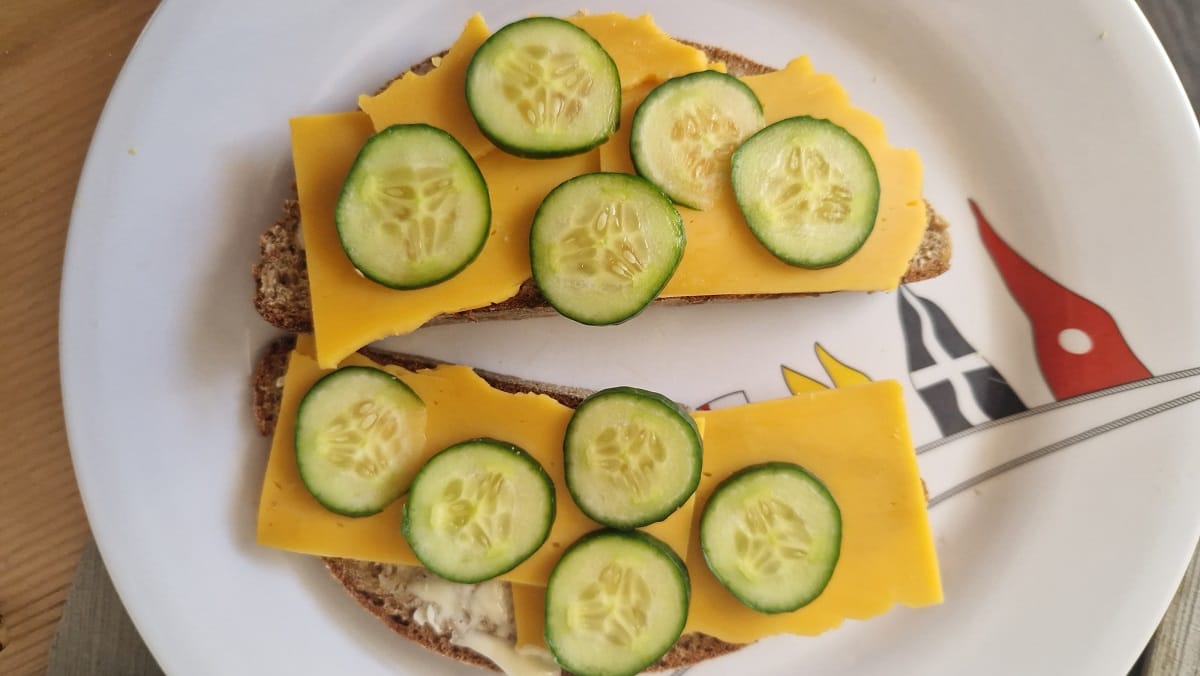
As predicted we raised the jib and mainsail as we turned the corner. The winds were light. Igor had put a precautionary reef in the main but shook it out when it became obvious that we didn’t need it.
As we sailed Vik called us. We told him how much fun we were having. Luckily England was having good weather too so he wasn’t jealous. We were approaching a landmark, a rock that, from the right angle, can look like a ship. It's name in Greek, showing great originality, translates to 'the Stone Ship'.
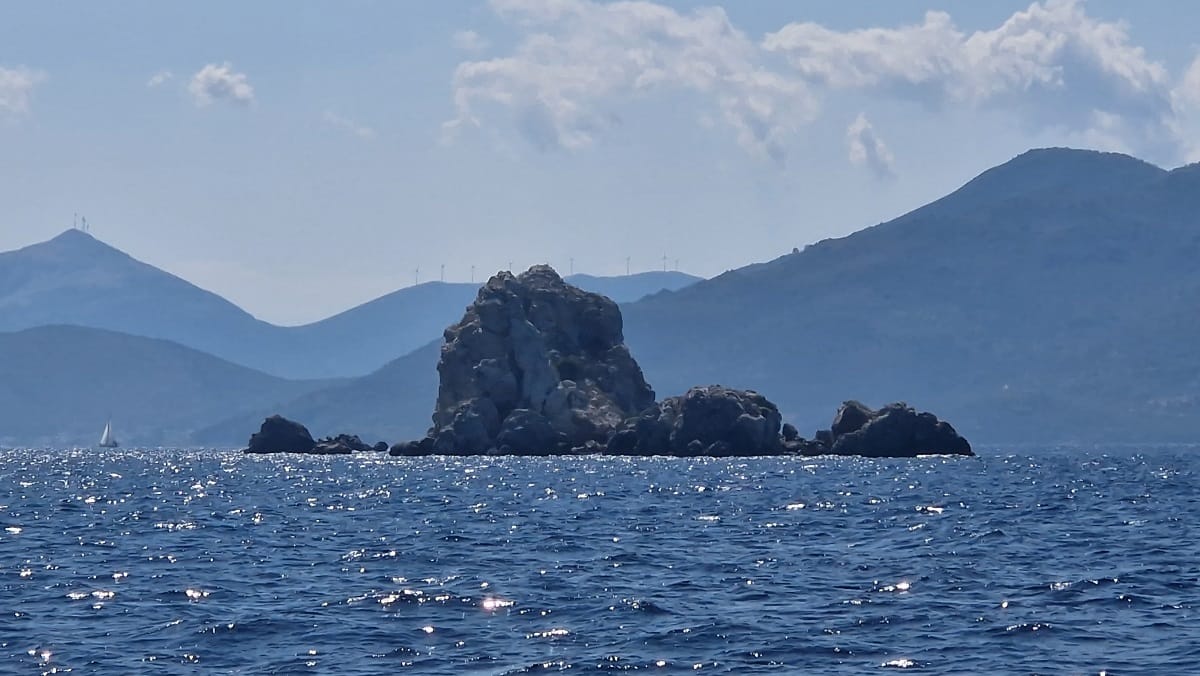
We needed to change our course, using a manoeuvre called a jibe (or gybe). There are two types of turns you can do on a sailing boat. If the wind is ahead of you, you tack. This should be pretty smooth, you change your course, the foresail gently moves from one side of the boat to the other, the boom (with the mainsail) follows gently, and off you go.
Tacking is useful when the wind is on your nose ie blowing the wrong way. A series of 90 degree turns allows you to travel upwind against the prevailing wind direction.
Jibing is similar but for when the wind is behind you. Jibing can be more dramatic. The foresail whips across the deck and, unless you are very careful, the boom flies above your head until the rope holding it, the mainsheet, stops its progress with a violent crash. It is very dangerous, potentially fatal, to put your head in the way of a flying boom. To minimise the risks you should tighten your mainsheet to hold the boom in place along the centre line of the boat before you start the jibing manoeuvre.
Our autopilot, made by the French company NKE, has a function to simplify tacking and jibing if you're sailing short handed. In 'wind' mode it changes your course so that you end up at the same angle to the wind but on the opposite tack rather than just a standard 90 degree turn.
I talked Vik through the jibe, it went incredibly smoothly, no drama. He was impressed. Jibing often involves a lot of shouting and swearing lol. After this the wind picked up so instead of creeping along at 3-4 kts it was nearer 5 or 6.
After speaking to Vik I went below for something. Igor said he was going to jibe again and not to come out until he said. I went into the cabin and took it easy. Suddenly there was no mistaking that we’d jibed. The boat rolled to a definite angle of heel, the water roared past the hull. The bin in the saloon flew open and the table on my side of the cabin started to bang.
Igor still hadn’t said to come up. He yelled ‘9 knots!!’. I wasn’t sure if he was talking to me or another boat. It sounded like mayhem and he asked why I was still down there. I told him he hadn’t given the word. Seems we jibed and the wind angle and strength were suddenly all in our favour so we were flying. This was the life, we maintained a speed of 8+ kts until we got to Aeginitissa Bay.
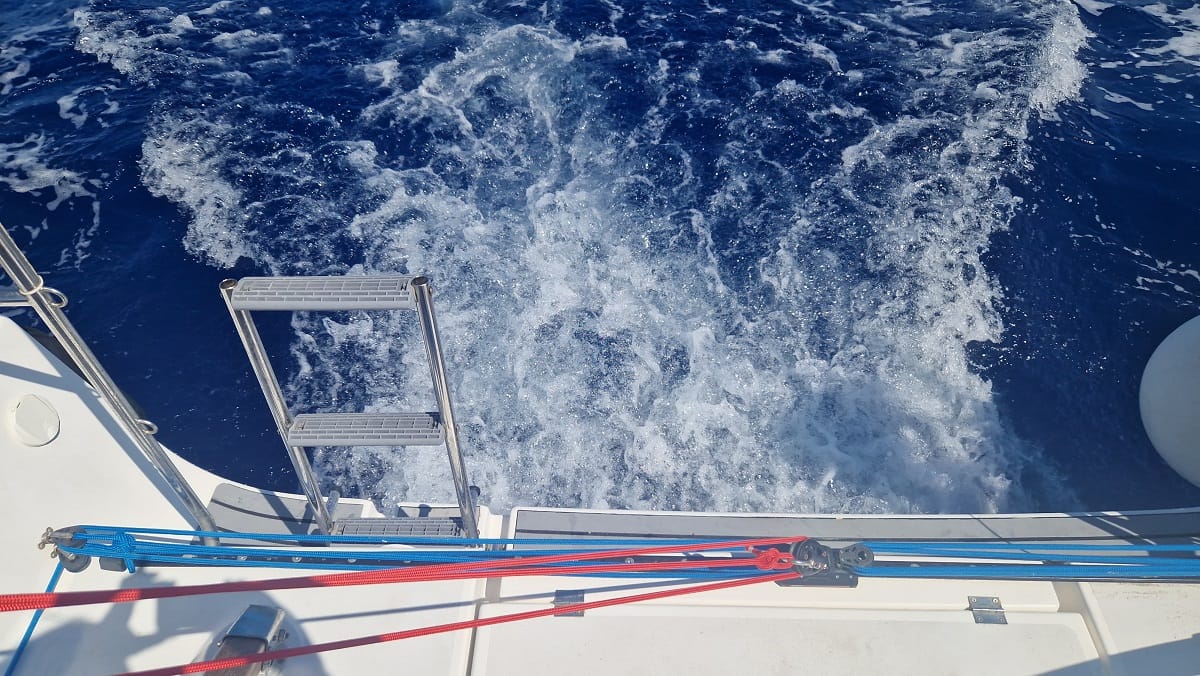
It was tempting to carry on but we’d decided to spend the night in the bay. We took the sails down and motored in.
For dinner I originally suggested getting gyros but I’d changed into my pjs after having a pre dinner swim so didn’t fancy getting dressed again. I fried up bacon with onion and some potato and served it with a tin of giant Greek beans with feta. Very nice, ate on deck with a beer looking at all the boats.
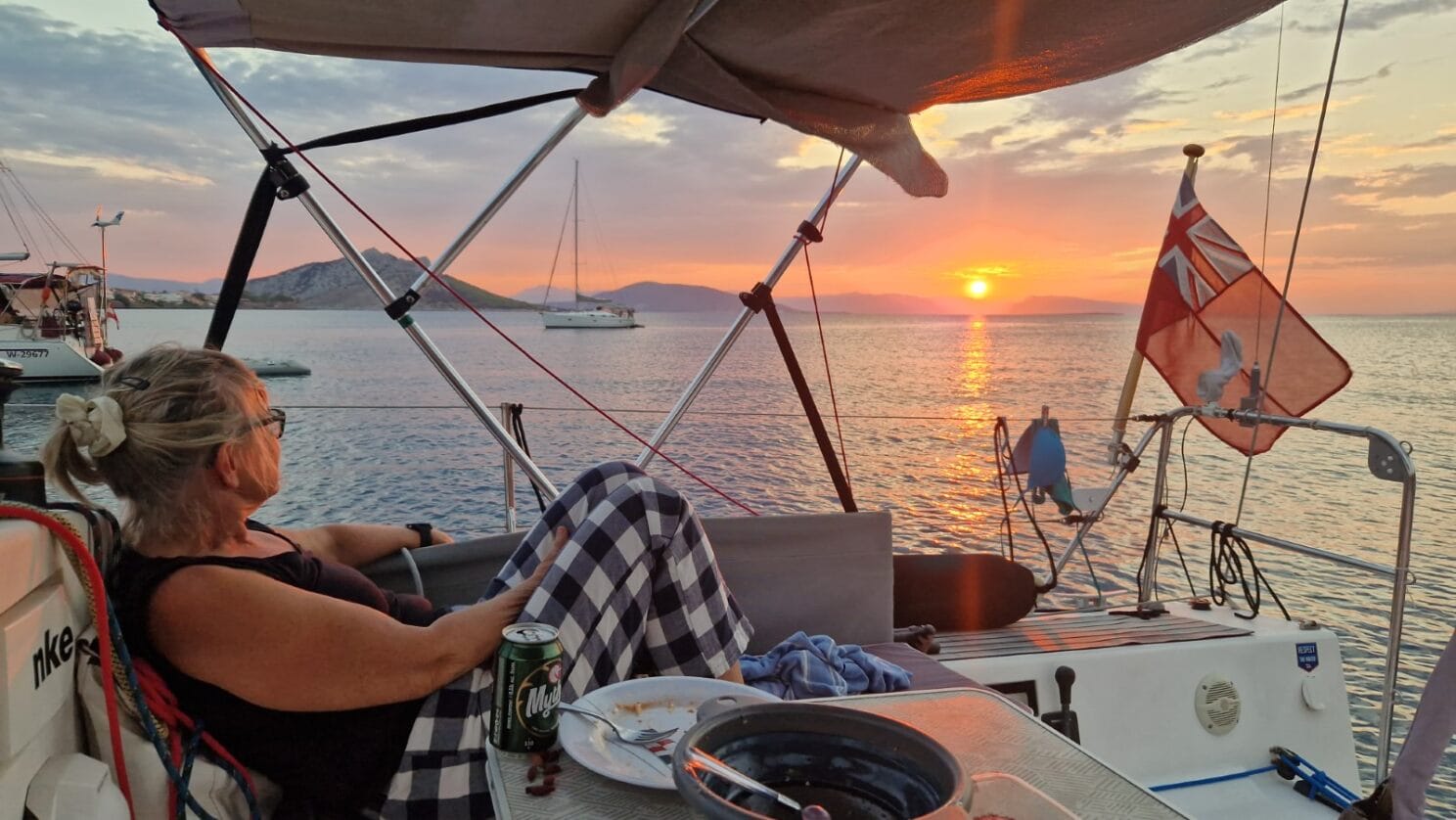
Before bed I went outside on deck for a look around. So still, a wonderful smell of pine wood on the air. Much better than hydrogen sulphide. It’s so good to be back.
*only kidding, it’s lovely but beware the idiot charterers!
** if the wind is in the wrong direction it really does smell of rotten eggs. Thankfully this doesn't happen too often.
You can comment (or ask questions) at Libra Sail | Facebook